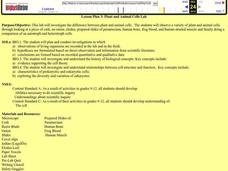Curated OER
AP: Chapter 26: Origin of Life
Five pages take biologists on a generalized survey of the origin of life. Queries are made regarding theories of how life developed, ancient Earth conditions, and the ever-changing field of taxonomy. The experiments of different...
Curated OER
Cell Organelles
Young scholars explore biology by researching living cells. In this living organism lesson, students participate in a role-playing activity in which all the young scholars in class form one plant cell by portraying specific parts of a...
Curated OER
Cell Cookie Lesson Plan
Students review the structure and fuctions of plant and animal cells. They use various types of materials such as sugar cookies and cake frosting for this activity.
Curated OER
Cell Cycle Duration
Students examine the cell cycle and how its duration can vary. In this cells lesson students complete a worksheet and answer questions.
Curated OER
Plant and Animal Cells
Students investigate the difference between plant and animal cells. They observe a variety o plant and animals cells by looking at a piece of cork, an onion, elodea, prepared slides of paramecium, human bone, frog blood, and human...
Curated OER
Cellular Models
Each student construct a model of a cell on a large cookie, including the parts which were discussed during lecture.? Half of the class will be instructed to make plant cell models and the other half will be in charge of animal cell...
Curated OER
The Great Animal Systems Challenge!
Advanced placement biology aces list systems that have evolved over time, adaptations, and structure-function relationships. The resource requires plenty of writing to answer these questions, so allow a few days for them to complete the...
Curated OER
Biotechnology
A continuous cascade of information comes through this PowerPoint on biotechnology. The topic is defined, a history is presented, and basic genetic engineering techniques are explained. The topic is covered in an objective manner,...
Serendip
The Molecular Biology of Mutations and Muscular Dystrophy
Different types of mutations cause unique types and degrees of muscular dystrophy. Scholars learn about the types of mutations and the impact on the body. They compare the location of the mutations and draw conclusions about how it is...
Radford University
Are You Faster than Bacteria?
Just how fast does bacteria grow? Over the course of three lessons, pupils investigate exponential growth with the use of bacteria growth. During the lesson, bacteria from a cell phone is grown to make a connection to real life. Using...
Howard Hughes Medical Institute
BCR-ABL: Cancer Protein Structure and Function
How do scientists discover treatments for cancer? A presentation and accompanying worksheet explain how one cancer spreads and a theory of how to stop it. It details the trials and relapses after using the medication. Scholars learn...
Nuffield Foundation
Observing Water Moving Through Plants
We know plants assist in the water cycle, but how do plants get water from the ground into the air? Through a series of demonstrations or labs, scholars observe the movement of water through plants. They microscopically view the cells...
Curated OER
Apoptosis: Programmed Cell Death During Development
Students model the plasticity of neural pathways for memory in the brain. They simulate the cell activity according to dots on cards that they are given. They complete various simulations of different cell combinations.
Ask a Biologist
Neuron Anatomy Activity
Reinforce the neural connections in the brains of your young biologists with a simple anatomy worksheet. Looking at the provided diagram of a neuron, students are asked to correctly identify and describe the function of each of the six...
Curated OER
Biology: Understanding Cellular Organelles
Students distinguish the differences between Prokaryotic and Eukaryotic cells. Using microscopes, they examine a variety of plant and animal cells. Working in groups, they draw and label plant and animal cells and show the mathematical...
Curated OER
Games and Activities to Teach Molecular Genetics
Students demonstrate a working knowledge of cell interactions such as DNA replication, protein synthesis (transcription and translation), through active participation in a cooperative group.
Curated OER
Control of the Cell Cycle
In this cell cycle worksheet, students review how enzymes control the cell cycle and what happens when the cell cycle becomes uncontrolled. This worksheet has 7 short answer questions.
Curated OER
Organelle Want Ads
Students review the components of the cell by creating advertisements for organelles in this activity reviewing cell contents. The lesson can be completed in 30-40 minutes and ends with a review question for individual, student assessment.
Curated OER
Intro to Biology Chapters 1 & 2 Practice Test
Don't be fooled by the title - this biology quiz could serve as an AP biology or college-level biology quiz. Some of the molecules represented may be difficult to identify without seeing the textbook from which this is based. It could...
Curated OER
Metabolism & Enzymes
More extensive than just a general overview of digestion and reactions, this slide show gives information about all areas of enzyme function. Topics like the chemistry behind efficiency of enzymes, factors that affect speed of reaction,...
Curated OER
The Immune System
Activate the immune system in the brains of your biologists! This worksheet calls upon learners to explain the structure, function, and problems associated with the immune system. This worksheet is helpful for the advanced placement...
Curated OER
AP: Chapter 45: Chemical Regulation & Communication - Hormones and the Endocrine System
Infuse your AP biologists with the details of the endocrine system. This six-page worksheet queries learners thoroughly about gland structure and hormone function. Ms. Foglia, the author, has not left anything out of this resource,...
Curated OER
Remember This?
Students investigate the mechanics of an fMRI and the properties of neurons. In this biology lesson, students analyze the way the brain works by performing tests in the neurons in the brain. This is all done theoretically.
Curated OER
Diffusion across a Selectively Permeable Membrane
Lab groups fill a section of dialysis tubing with glucose and starch solutions and suspend it in a water bath. They use iodine as a starch indicator and a glucose test strip to find out if either of the materials crossed the selectively...

























